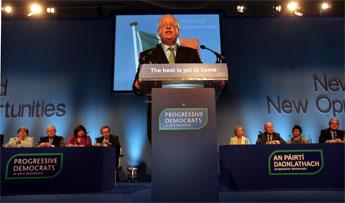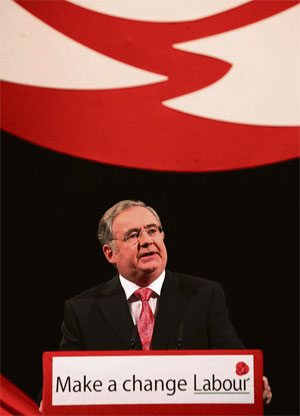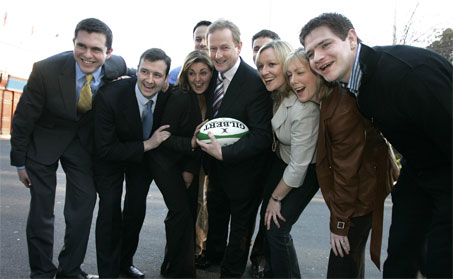Star of the campaign, loser of the election?

The election is about marketing and strokes, not about how to use our massive wealth to resolve social inequities. By Vincent Browne
Michael McDowell defined what current Irish politics is about in his leader's address to the PDs annual conference on the evening of Saturday 17 February. It is about prosperity, and any party that loses that focus has lost the plot.
Bertie Ahern will not disagree. Neither will Enda Kenny or Pat Rabbitte. Perhaps murmurs of disagreement from the Greens and growls from Sinn Féin but, for all the main parties, prosperity is where it is at, not what we might do with it.
The performance in Rosslare by the PDs was flat, certainly the televised Saturday night segment. Liz O'Donnell implausibly praised her leader, a person she loathes. There were reservations buried in her words but the impression was that all is fine now within the party, after the sit-com traumas of 2006.
Michael McDowell himself was awkward. The speech would have been a good Sunday Independent comment piece by the standards of that newspaper but as an address to a party conference, it was dull. It hardly matters, few vote will have been won or lost by the performance, what is more interesting is the indication of the tenor of the PD campaign to come.
The line “the best is yet to come” is clever. Inferring there have been good times but will be better. McDowell is a clever campaigner, a good debater and as the campaign unfolds there will be more good lines and bold strokes, such as the promised reduction of two percentage points in the standard rate of tax and three points in the top rate. The promise on stamp duty might win votes too, even though it will do nothing at all for house prices (the move will simply transfer the stamp duty revenue from the public purse to the already overflowing purses of developers).
 Pat Rabbitte's stroke the previous weekend on reducing the standard tax rate by two percentage points was also adroit. Not that it matters that much to anybody but it establishes Labour in the tax-cutting bracket. Michael McDowell's charges of Labour being a high-tax party are confounded at a stroke. But the slogan now on billboards around the country “But are you happy?” invites memory only of that famous scene in Claridges Hotel in London some time in the mid 1970s when George Best was shacked up in a suite with a gorgeous Miss World, and £20 notes were strewn around the room, money George had just won at a casino nearby, and an Irish porter asked him, “But are you happy?” (Or was it, “Where did it all go wrong?”)
Pat Rabbitte's stroke the previous weekend on reducing the standard tax rate by two percentage points was also adroit. Not that it matters that much to anybody but it establishes Labour in the tax-cutting bracket. Michael McDowell's charges of Labour being a high-tax party are confounded at a stroke. But the slogan now on billboards around the country “But are you happy?” invites memory only of that famous scene in Claridges Hotel in London some time in the mid 1970s when George Best was shacked up in a suite with a gorgeous Miss World, and £20 notes were strewn around the room, money George had just won at a casino nearby, and an Irish porter asked him, “But are you happy?” (Or was it, “Where did it all go wrong?”)
The auction is already under way before either Fianna Fáil or Fine Gael have got into the auction room. Fianna Fáil's ard fheis is on the weekend of 23-24 March in City West. Fine Gael will be at the same venue the following weekend. More of the nation's wealth will be auctioned those weekends to the owners of that wealth than ever before.
The election is about office, not about changing anything. It is now a cliché of Irish politics that it doesn't matter who wins the election, the government will still be in power. Meaning it makes no difference which party or set of parties win, the policies will be broadly the same, the debacles will be mainly the same, the vast wastage of public funds will be mainly the same, the endemic unfairness will be mainly the same.
The polls say Fianna Fáil will be back in power with Bertie Ahern as Taoiseach in coalition either with the PDs, Labour or the Greens. But there is another plausible outcome: that Fianna Fáil gets an overall majority. It is unlikely but not implausible and it could come about as follows.
If the polls over the next three months continue to suggest that Fine Gael have little chance of getting into government, there will be a seepage from Fine Gael, in part towards Fianna Fáil, allowing that party to get 41 or 42 per cent of the vote. And from that base, with its tight vote-management and candidate strategy (aside from Bertie Ahern's own constituency), it is possible for Fianna Fáil to get 84 seats. It is being aided and abetted in that by Fine Gael's chaotic candidate strategy – running too many candidates in several constituencies, thereby ensuring it will fail to win seats it otherwise could take.
But even if Fianna Fáil fails in that objective and it has to engage in yet another coalition, it will have been in power by 2012 for a quarter of a century, bar the blip of the John Bruton Rainbow two-and-a-half-year government in the mid 1990s. Fianna Fáil will not have lost power in any election since 1982, two successive hat tricks (1987, 1989, 1992, 1997, 2002 and 2007). Never in the history of the state has this been done before and nowhere in the “democratic” world has it been achieved.
There is no predicting how the PDs will fare. The polls are entirely unreliable in determining the level of support for the smaller parties because the base is so low and the margin of polling error so great. The PDs could collapse or could come back at around the same level. Michael McDowell is likely to be the star of the campaign but also perhaps the loser of the election. But it hardly matters now becau se there is such little difference between the PDs and the others. What, for instance, is the difference between the PDs and the Labour Party except that the PDs are committed to giving more to the old-age pensioners than Labour? Yes, there is disagreement on the privatisation of part of the health service, but aside from that?
se there is such little difference between the PDs and the others. What, for instance, is the difference between the PDs and the Labour Party except that the PDs are committed to giving more to the old-age pensioners than Labour? Yes, there is disagreement on the privatisation of part of the health service, but aside from that?
The Greens are in a muddle. Dan Boyle, their finance spokesperson, is one of the ablest TDs in the Dáil but he is a poor communicator and therefore whatever alternative strategy offered by the Greens is muffled. The uncertainly about their coalition options is not helping either – would a vote for the Greens amount to a vote for Fianna Fáil?
Sinn Féin too seems in a slump. Its “unique selling point” is gone – the IRA influence in the Northern peace process. It has failed to define itself outside the Northern Ireland issue, which is now not an issue at all, since Sinn Féin, along with all the other “nationalist” parties, have become unionists (all agreed that the constitutional status of Northern Ireland can be changed only with the consent of a majority of the people of Northern Ireland – the distinctive unionist position for decades).
Pity Fine Gael. Enda Kenny has salvaged the party and himself from the debacle of 2002 but it seems insufficient. That candidate strategy will do the party great damage. The party is another with no “unique selling point”. Its front bench is unimpressive, with the obvious exceptions of Richard Bruton and perhaps Liam Toomey and Olwyn Enright. It will struggle to offer anything distinctive in the last weekend in March, six weeks out from the election.
It's all about marketing now and focus groups and strokes. Not all about the inequalities and unfairness in society and how we might use our now massive wealth to act on them.
